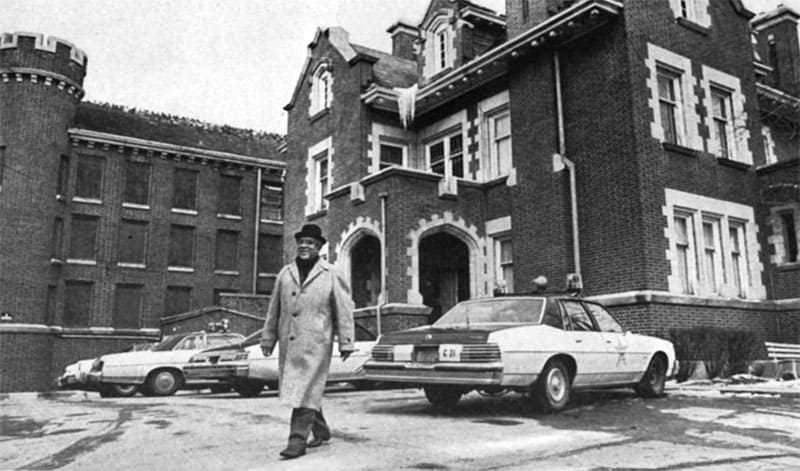[ad_1]
The following article was originally published in the April 1980 issue of EBONY magazine.
ON A HOT, suffocating August night in 1930, a frightened, 16-year-old boy was pulled from his home in Marion, Ind., and taken to the Grant County Jail. Earlier that evening, a White man had been shot and lay near death after a robbery attempt, in which his girlfriend was raped. Police quickly apprehended 18-year-old Thomas Shipp, 19-year-old Abram Smith, and 16-year-old James Herbert Cameron. What followed in the next 17 hours is a true story of terror and brutality, a blood-chilling example of human savagery, chronicled in Cameron’s book, From the Inside Out: A Lynching in the North, scheduled to be published this spring.
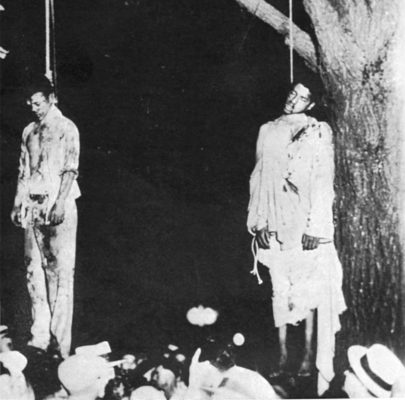
In perhaps the most famous photo of a lynching, Thomas Shipp (left) and Abram Smith hang from a tree on the Marion, Ind., courthouse lawn on the night of Aug. 7, 1930, the victims of a mob inflamed over the murder of a White man and assault of the man’s girlfriend.
James Cameron was nearly the third victim of a huge lynch mob of Ku Klux Klansmen and their sympathizers. Now 66 years old and an air conditioning and refrigeration engineer in Milwaukee, Cameron vividly recalls how 10,000 people surged to the door of the jailhouse shortly after learning that the wounded man, Claude Deeter, had died of his wounds. Men using sledgehammers and, armed with crowbars and guns, broke into the cellblock where Tommy Shipp was held. With the apparent complicity of some jail officials, the men produced a set of keys, opened up Shipp’s cell, dragged the prisoner out and beat him unconscious. Dragging his limp body outside, an enthusiastic crowd helped to hang the young prisoner from the bars of a second floor jailhouse window.
Next, the ringleaders returned inside the jail, pulled Abram Smith from his cell and beat him until he, too, fell unconscious. Dragged through the street as the crowd threw bricks, beat him with sticks and rammed crowbars through his chest, Abram Smith was dead before they hanged him from a limb of a tree on the courthouse square. The crowd returned to the jail to retrieve Shipp and they hanged his body alongside Smith.
The crowd, apparently thirsty for more blood, came back to the jail once again—this time, they wanted Cameron. His story of his ordeal follows:
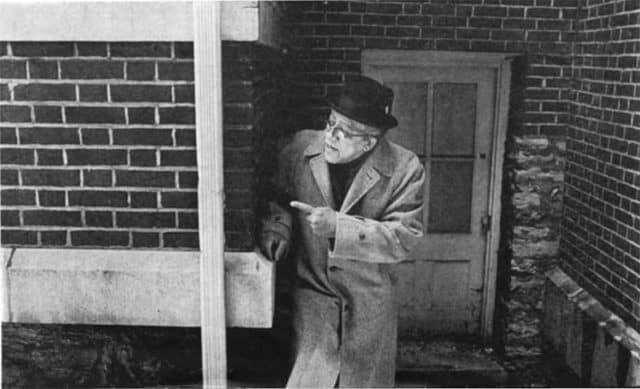
James Cameron was 16 years old at the time he narrowly escaped being the third victim that night. Fifty years later, he shows how sheriff’s police ushered him out of the back door of the Grant County Jail and out to a waiting auto where he was removed from Marion for safekeeping from the mob.
I COULD hear the mob tramping up the jail stairs. Time was running out for me. Outside the door, the corridor was fast becoming jammed with violent men, ruthless men, Black-people-hating White men. The leaders held back until they quieted down. The men, carrying ropes, shotguns, knives, clubs, swords and rifles, gathered around the door of my cellblock. They were the elite group of Black intimidators. Their act now was to complete the path of destruction, death and tryanny. While they were deciding on the kill, I closed my eyes for a moment to will my disappearance. I opened them again when I heard the eerie jangling of keys on the key ring. I was still in the cellblock. There was no time to hide. There was no place to hide. Events happened so fast there was not even time to pray.
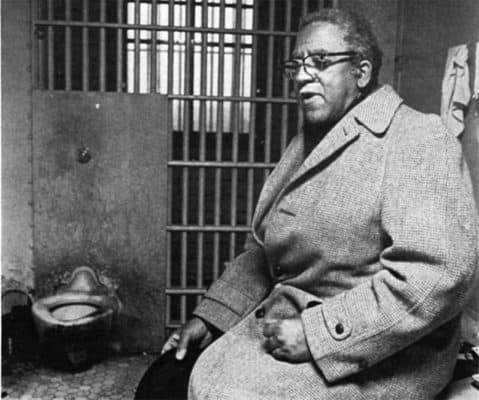
Cameron visits the cell at the Grant County Jail where he was held the night of the lynchings.
I was standing in a corner with seven or eight other Black prisoners. Somehow, I felt a small measure of security with them so near. I believed with all my heart, perhaps because I wanted to believe it, that they would have fought the mob to their deaths had they anything with which to fight.
A man with a sub-machine gun entered the cellblock first. A young White girl, very pretty, still in her teens, followed closely behind. Her eyes were wide, like a frightened doe. They seemed to me to be full of question and uncertainty. While the machine gunner held us inmates in our tracks, several other men, dressed in the simpleton dunce-shaped headgear of the Ku Klux Klan, flooded the cellblock with the others. The corridor inside the cellblock was jammed tight with mobsters.

The morning edition of the Indianapolis Star carried the story of the Marion violence the following day. In that story, correspondent Joseph Shepard wrote that the uncle of the girl who claimed she had been assaulted clambered to the top of the courthouse steps and shouted, to the crowd to let Cameron, possibly an innocent man, go.
Meanwhile, two men with drawn pistols had separated me and Charles, the other 16-year old, from the rest of the prisoners.
“What’s your name?” Charles was asked.
“Charles Haynes,” he answered, shakily.
“Mine’s Henry Burton,” I lied to them.
Sheriff Campbell made his way over to the small group surrounding me and Charles.
“Come on,” he said to the men, impatiently. “Let’s get out of here! These are nothing but boys. Cameron isn’t in here, anyway. You’ve already hung two of them. That should satisfy you!”
Reluctantly, they withdrew from the cellblock and returned to the gay crowd down in the streets. I began to hope for the first time. Now I had time to say a few prayers. I prayed for deliverance.
One of the first mobsters to reach the street called out to the crowd: “Cameron ain’t in there!”
“That’s a damn lie,” came the angry response from the crowd. “He’s in there and we aim to get him! We want him!” The whole multitude seemed to yell its approval. They stomped their feet, they began chanting, the way crowds do at a football game:
“We want Cameron! We want Cameron!”
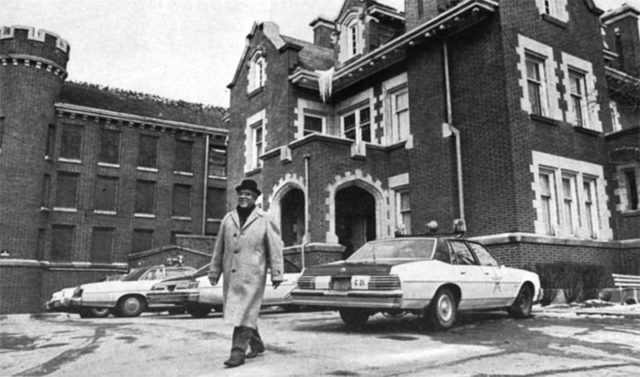
The fortress-like structure, he says, has changed very little since his incarceration there 50 years ago.
I thought I would die during that chant. To think they wanted me that bad! Again, I prayed, wondering if any kind of prayer would do any good. I wondered whether Abe and Tommy believed in prayers and whether they had prayed to God, too, before their deaths.
The noise in the streets made it clearly understood that the crowd was not going to accept anything less than the three of us. Repeated shouts, chants, demanding that I be dragged out of the jail, fell upon the ears of the leaders of the mob. I was the one person they wanted more than anything else.
The ring leaders huddled together and talked briefly among themselves. Then they turned and re-entered the jail. The crowd thundered its approval. A point had been made. The cheers were wild in enthusiasm.
I was it again!
The mobsters marched back upstairs to my cellblock. Again, the machine gunner led the way inside. No one dared to breathe.
Inside the cellblock, the machine gunner barked in a deadly tone, “Aw right, all you ni**ers get over to this side of the cellblock.”
He pointed with the barrel of his infernal machine just where he meant for us Blacks to assemble and line up.
We moved slowly, painfully, and formed a ragged, nervous, broken line along the north wall of the cellblock. I tried to hold back the tears. They kept rolling down my cheeks. My own whimperings, though, were soon lost in a jungle of pitiful bleats from the Black prisoners all around me. The mob might take one of them—or all of them. Who was there to stop them? Who was going to stop them? Law and order for the Black man was a national farce, a complete mockery. It had always been so in regard to the White man treating the Black man as an equal. The mob made its own law and order.
“James Cameron is in here and we mean to get him! Now, where in the hell is he?” members of the mob wanted to know.
An old Black man in a tattered plaid shirt and pants dropped to his knees. He held out his hands in supplication, as if in prayer:
“Please, Mister White Folks,” he sobbed. “Dat boy ain’t in heah. Honest he ain’t.”
They didn’t believe him. One of the mobsters kicked the old man in the face, knocking him back against the steel bars of the cells. The old man spit out seven or eight bloody, rotten teeth. His face immediately took on a frightening swelling that resembled a grotesque mask.
“Don’t you Black-a —- s.o.b.s lie to us,” one of the leaders shouted at the rest of the Black men. “If you don’t tell us who he is, we’ll hang every god-damn ni**er in this jail!”
I waited, afraid to move a muscle. Now the chips were really down. Now was the time for me to present myself as a living sacrifice. But nobody in the line moved. Heavy, labored breathing was the only sound. Impulsively, I acted like I was going to give myself up when Big John and another Black man grabbed ahold of me. I got the message.
And outside, the crowd had become very impatient. They took up their chant again:
“We want Cameron! We want Cameron! We want Cameron!”
The tension was racing to the top. Human endurance was fast approaching its capacity. Seven or eight of the Black men glared their defiance at the mobsters. They had become too angry to remember their own fear. But they were helpless and powerless to fight. They stood with me.
One of the mobsters stepped forward and smacked one of the defiant ones across the mouth with his fist, knocking the man to his knees. Then, all the prisoners but those standing with me broke ranks and fell down on their hands and knees. They crawled and groveled to members of the mob nearest them, like dogs to their masters. They made obeisance to representatives of the god of White supremacy. They hugged the mobsters’ knees, kissed their hands, and begged them to spare their lives. Several of the men began to bawl like little children lost in a frightened world. They begged with tongues thickened with fear. Tears rolled down their faces and into their gaping mouths.
“Lawd, ham mercy!”
“Please, please, don’t hurt us, Mister White Folks!”
It was a sickening and unbelievable sight. I am sure I would not have believed it had it been something told to me. But I saw the scene. I heard the words. I felt all the anguish and anxiety. But, at the same time, I knew in my heart I would have never acted like that as the price for my life. I would much rather be dead as a man than alive as a whimpering coward.
Still whimpering and pleading, Charles’ father looked up at the mobsters around him. He looked at his young son standing near me. He was a completely broken man in mind, body, and spirit. He lowered his head for a moment, as if in prayer. Then, slowly, painfully, it seemed, he turned eyes full of fear, and anguish, and surrender, to the comer where I stood. His voice quavered. His whole body shook with the emotion of naked fear. Uncontrolled tears ran down from his bruised and bloodshot eyes. The index finger on his gnarled hand was shaking as he pointed to me!
“Dere he is!” He said, finally, and slumped to the floor.
The other Black men down on the floor on their hands and knees, now that the ice had been broken, sobbed out their agreement:
“Dat’s him, Mister White Folks! Dat’s him! It ain’t none ob us! Dat’s him!” All of them seemed to be babbling at once.
For a brief second no one moved. But every eye was on me.
The mobsters surged forward in one great lunge, knocking and trampling the Black prisoners around me. Six of them got their hands on me right away, three on each side, and the merciless beating began. I tried to break out of their grasp, but there were too many of them. Their grips were fiercely firm. They beat and kicked me in the corner for several minutes before dragging me out of the cellblock. All the way down the corridor, all the way down the steel stairway, the angry pounding continued. So many clubs and hands were aimed and swung at me they got in each other’s way, sometimes. Now and again, one of the men holding me would cry out in pain, but they never released their holds on me.
Somehow, not because I wanted to, I remained dimly conscious. Through a thick haze mixed with my own blood, I saw the crowd come to life as we emerged from the jail.
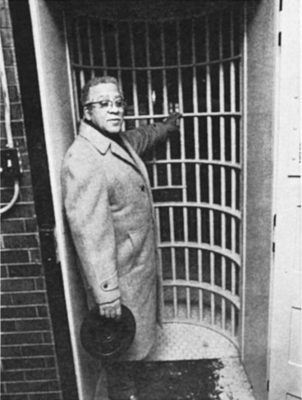
Cameron stands at the entrance to cellblock 2-West where he was held. A crowd of men wielding weapons beat Cameron before “escorting” him outside the jail.
“Here he comes!” they shouted. “It’s him! They got Cameron!”
The people pushed and shoved for a chance to get close enough to hit me. I was too weak to fight back anymore. The cruel hands that held me were like vises. I sagged and reeled lifelessly, but I still did not pass completely out. More fists, more clubs, more bricks and rocks found their mark on my body. Only the strongest and the biggest were able to get in close enough to inflict pain. The weaker ones had to be content with spitting on me and throwing things at me. Some of those holding me caught spittum in their faces as much as I did. Little boys and girls, not yet in their teens, but being taught by their elders how to treat Black people, somehow managed to work their way in close enough to bite and scratch me on the legs.
And over and over the thunderous din rose the shout:
“Ni**er! Ni**er! Ni**er!”
Again and again the word rang out until it seemed as if this was the only word in the English language that held any meaning in their lives. A crowbar thumped against my chest, glancingly. A pick handle crashed down against the side of my head.
I was too numb by this time to feel the excruciating pain anymore. The cruel and merciless blows which continued to fall no longer had any meaning. Once or twice, I thought I saw a kind face in the press around me. To each of these I called out for some kind of help while, at the same time, I gave to others a pitiful look, mutely imploring mercy. But nothing happened. The mob mauled me all the way up to the courthouse lawn.
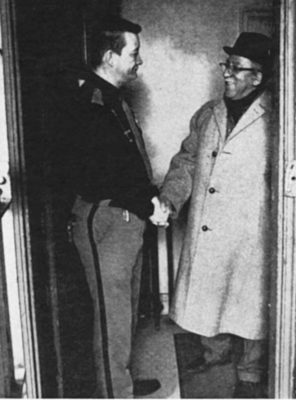
After 50 years, the visit to Grant County Jail is a friendly one, as Cameron shakes the hand of Corporal R. K. Hiatt and exchanges goodbyes with jail personnel.
Many uniformed policemen helped the mob to clear a path through the swarming thousands of people so that they could get me all the way up to the tree where Abe and Tommy were hanging in shredded clothing.
“Where’s the rope?” somebody yelled.
I felt my stomach shrinking. My whole body felt as if it had been encased in ice packs. I was shocked into something approaching full consciousness. I screamed as loud as I could above the din and the roar of the crowd that I had raped no woman, I had killed nobody.
Rough hands grabbed my head and stuffed it into a large noose. The rope was handled so roughly that it seared my neck. For a moment, I blacked out. I recovered in a second, though, as they began shoving and knocking me closer to the tree and under the same limb weighted down with the half-stripped bodies of Abe and Tommy. All my days and nights seemed to flash before me in my mind’s eye. I remembered what my mother had told us children about sinners facing death:
“The Lord will forgive and have mercy on their souls if the sinners will call on Him.”
I knew I had nothing to lose. Everything was to gain. I couldn’t be any worse off than I was at that moment.
“Lord,” I mumbled through puffed lips, “Forgive me my sins! Have mercy on me!”
I stopped thinking then. In my own mind and body and soul, I was already dead and was glad to be leaving a world filled with so many false and deceitful people.
One end of the rope snaked out and sailed up out of the mob and fell across the limb of the tree. But before the crowd could hang me, it happened! A voice rang out above the deafening roar of the mob. It was an echo-like voice that seemed to come from some place far, far away. It was a feminine voice, sweet, clear, but unlike any voice, any sound, I had ever heard. It was sharp and crisp, like bells ringing out on a clear, cold, wintry clay.
“Take this boy back. He had nothing to do with any raping or killing!” That was all the voice said!
Abruptly, impossibly, a deadening, deafening, shattering quiet settled down over the mob, as if they had been struck dumb. No one moved or spoke a word. The maddening fury of the mob had been quelled in the twinkling of an eye. An eternity passed. Then, hands that had been rough, and ready, and willing to kill moments ago, hands that had already committed cold-blooded murder, became soft and tender, kind and helpful. I could feel the hands which had beaten me unmercifully removing the rope from around my neck. Now they were caressing hands. The angry press of men and women around me melted instantly. I suddenly found myself standing alone, under the death tree, mystified!
The mob had drawn back. Many heads were bowed. A path had miraculously opened from the tree where I stood to the steps of the county jail. Slowly, painfully, I limped back toward the jail, dragging myself as best I could. Each step was a prayer and each prayer was a “thank you, Jesus.”
No one touched me on the way. No one called out any angry, racial epithets. I looked into the faces as I limped along. They were tired, serious faces now, with shame staring out of their eyes. Their gazes invariably dropped when their eyes met mine.
I do not pretend to understand the why of this event. For even though the voice had sounded so clearly in my ears, no one else in the mob heard it! Yet, all obeyed its command at that instance. I later interviewed hundreds of men and women who said they had been in the crowd that night. Not one of them heard the voice! Their explanation usually was:
“You were just lucky.”
But there is no doubt in my mind that I heard it—calling out strained and sincere, with a definite note of command. I am convinced that no person in the mob spoke those words. No mere mortal could have commanded such obedience from that angry ten thousand. For the voice had spoken only once and the raging fury of the mob was, instantly, in the twinkling of an eye, kind and gentle and understanding! Perhaps, I have told myself, they had tired of wanton and malicious killings. Maybe it had been because I looked so much younger than Abe and Tommy. I can give no explanation. But in my own mind I believed, and still believe, that God answers prayers.
When I reached the jail, Sheriff Campbell took me by the arm and supported my tired and sagging body. He led me downstairs to a basement complex. I was still sagging and reeling, groggy and wobbly. All of my clothes had been torn to shreds. I was black and blue with ugly bruise marks. I barely was able to stand and walk. A tiredness weighed heavily on me as though I could have lain down and closed my eyes, and slept forever.
I could not understand why I had remained in some kind of a conscious state throughout the terrible beating I had received. Silently, I gave thanks to God for my deliverance.
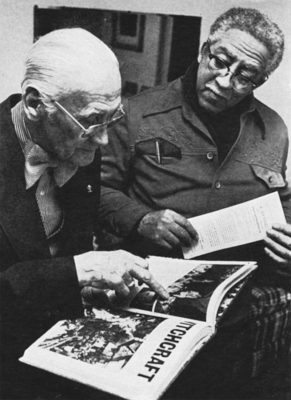
Jack Edwards was the 29-year-old mayor of Marion in 1930. Shortly before the mob stormed the jail, Edwards came to visit Cameron in his cell. The two had not seen each other since that night until recently, when the 79-year-old former mayor and Cameron shared their recollections. Edwards recalls the names of several townsfolk who were in attendance at the lynching and whose faces appear clearly in photographs.
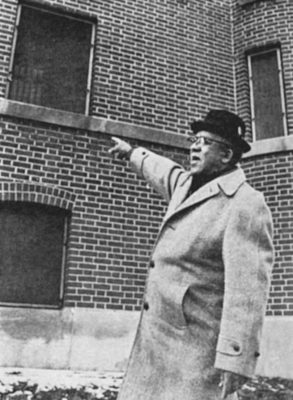
Pointing to the window where the crowd hanged Shipp’s body, Cameron recalls how his companion had struggled against the hangman’s noose before he died.
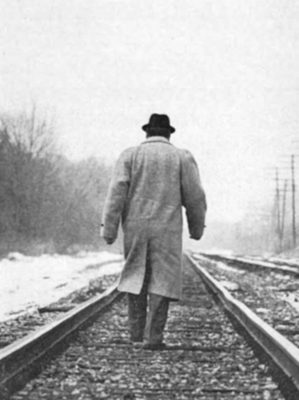
Cameron retraces his steps along these tracks the night he ran from Lover’s Lane just minutes before the crime occurred. Cameron ran five miles to his home.
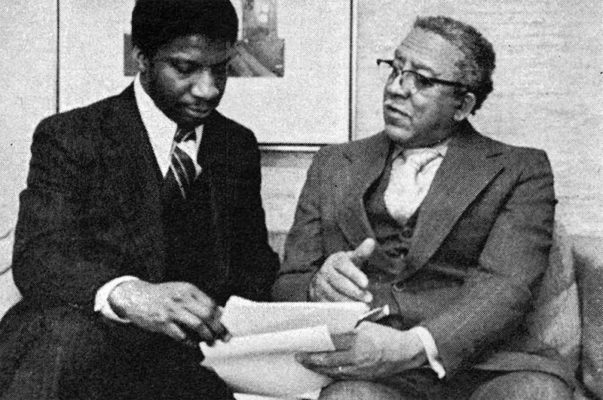
Cameron discusses his manuscript with Welmon Walker Jr., president of That New Publishing Co. in Fairbanks, Alaska, the firm that will publish the book this spring.
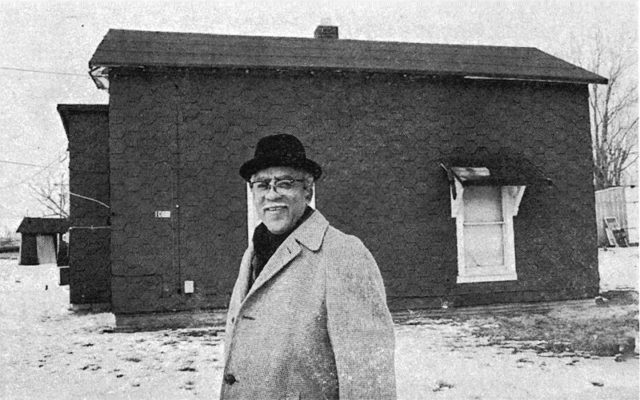
The old clapboard house, once a barn, where Cameron lived as a youth with his mother, step-father and two sisters, still stands at the corner of 31st and Poplar streets in Marion, a block from the county line. The area remains largely rural.
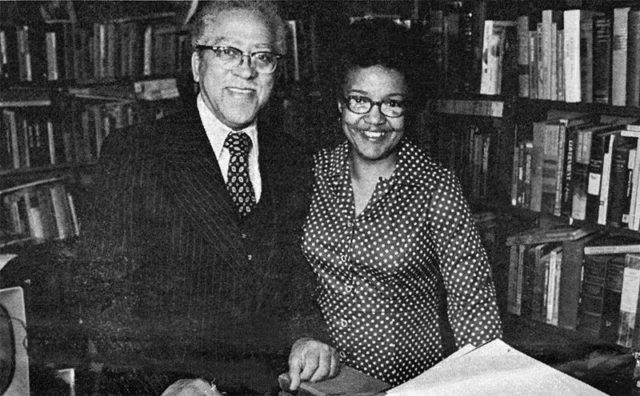
Cameron met the former Virginia Hamilton after his release from jail. They have been married 41 years and have five children. Now living in Milwaukee, the Camerons manage a rug cleaning business. Cameron also works as an engineer.
In newspaper accounts of the lynching the following day, correspondents reported that a man claiming to be the uncle of the young woman who was raped sprang to the top of the courthouse steps and pleaded with the crowd to let Cameron, who was probably innocent, go free. Cameron was later removed from Marion to a reformatory in nearby Anderson, Ind., for safekeeping. He was eventually convicted of being an accessory before the fact to voluntary manslaughter in connection with the death of Claude Deeter. He served four years in prison.
For 50 years, Cameron has been an outspoken observer on race relations in the United States. In the early 1940s, he organized the Madison County, Ind., branch of the NAACP and served as its first president. Concurrently, he served as Indiana state director of civil liberties. Over the years, he has written regular columns on race relations for Black newspapers. From the Inside Out is his first book.
[ad_2]
Source link

